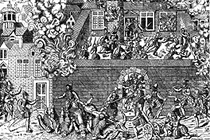|
Spread of
Protestant ideas
Edict
of Nantes 1598
Louis
XIV's support for catholic
causes
Wars for
the glory of France
Revoking
the Edict of Nantes 1685
Effects
of persecution of Huguenots
The spread of
Protestant ideas
In 1517 a German monk, Martin Luther, started an explosion
of protest against corruption, abuses of power and teachings
of the Roman Catholic church. His followers,
“protestants”, called for people to rely on the
Bible rather than on bishops and the Pope; and to worship in
a simpler way.
In England king Henry VIII quarrelled
with the Pope over getting a divorce, and set up his own
protestant church, the Church of England.
|

St Bartholemew's Day massacre of protestants in Paris, 1572.
About 20,000 Huguenots were killed, on the orders of the
Queen Mother, a catholic who feared the influence of
protestants over her young son, the king.
|
|
France remained
Roman Catholic
This was an era when every aspect of life was influenced
by religious belief. Royal power and the wealth and
privileges of the nobility were seen to be justified by
religion. French Protestant communities - "Huguenots" - were
mainly in the towns of the south and west.
From 1562 to 1598, France was split by
religious wars: the protestant minorities were cruelly
persecuted by powerful catholic nobles as well as wealthy
bishops. News of the St. Bartholemew's Day Massacre in 1572
shocked Queen Elizabeth's court in protestant England. Many
French fled into exile. Eventually protestant King Henri IV
came to the throne, but had to adopt the catholic faith.
Henri's Edict of Nantes in 1598 ended the wars
by offering the protestants a few towns where they could
defend themselves. The great majority of French people, in
the North as elsewhere, remained Catholic.
|
|
Louis XIV's
support of Catholic causes
The autocratic French king Louis XIV was convinced of the
principle "One faith, one king, one law." He was the most
powerful king in Europe, and a Catholic. Many of his wars
had a religious edge to them, "protestants vs. catholics" -
his constant enemies were the protestant English, Dutch, and
some of the German princes. He gave support to English
catholics, and made the secret Treaty of Dover with Charles
II in 1670 to restore Roman Catholicism to England. Later,
he supported the cause of catholic James II, who was deposed
in 1688, in the "Glorious Revolution", and also of Scottish
catholic princes.
Back to
top
|
|
17th century
wars
His first love was the "glory of France". Catholic Spain was
France's traditional enemy, but by the 17th century its
empire was weak and crumbling. Having married the daughter
of the Spanish king, Louis spent much of his life fighting
over the spoils to be had in dismembering Spain's
territories. His success in conquering much of Spanish
Netherlands, brought many more Protestants from the
cloth-working towns of Flanders under his rule. (see
History of
Flanders). It also brought him into
conflict with the strongly protestant northern part of the
Netherlands, the Dutch Republic. (see William
of Orange).
Back to
top
Louis XIV revokes
the Edict of Nantes 1685
Personally, in middle age Louis XIV became more
religious - though it did not stop him keeping several
mistresses. Encouraged by his catholic clergy, including
inflential Archbishop Fenelon of Cambrai,
Louis sent royal troops on raids to force French protestants
- known as 'Huguenots' - into mass conversions to
catholicism. The king ordered "no violence", and it is
possible that he was not aware of the excesses of his
over-zealous officers. Finally in 1685, he revoked the Edict
of Nantes, which by then gave little protection to French
Protestants. He banned practise of any religion except Roman
Catholicism in France. More than half a million Protestants
fled the country after more horrible massacres by royal
soldiers.
Back to
top
|
|
Economic
disaster
The persecution of the protestants was popular with the
catholic bishops, and with many French people. But French
philosopher Voltaire described it as "one of the greatest
disasters that ever afflicted France". Without the
Huguenots, the army and navy were much weaker, and French
industry lost many of its most highly skilled craftsmen, who
set up business in exile, to the benefit of France's enemies
in England, Germany and the Netherlands.
Back to
top
|
|
|
|
Background
information
King
Louis XIV -
persecuter of the Huguenots
Church
& Religion
Retables
& the
Counter-Reformation
English
Catholic refugees
Hondeschoote
- a town of Protestant cloth-workers
|
|

